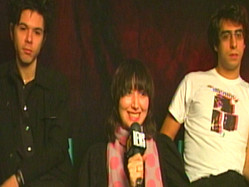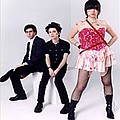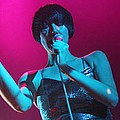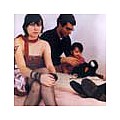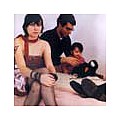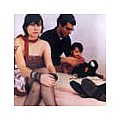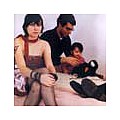On April 29, 2003, the Yeah Yeah Yeahs released Fever To Tell, the album that transformed them from arty, slighty-acrid art punks into one of the biggest bands in the world.
Thanks to the word-of-mouth success of their self-titled 2001 EP, and a solid year of gigs opening for the likes of the Strokes and the Stripes, the YYYs were clearly poised on the verge of something on the day Fever dropped — after all, they were from NYC, they wore black, Karen O. was dating that dude from Liars, etc — though no one was really sure what would happen next. Remember, all the hype in the world couldn't turn Stellastarr or Ambulance LTD into superstars.
And yet, neither of those bands (or any of the countless others who emerged from the burgeoning NYC scene) were capable of making an album like Fever To Tell, the rare rock record that managed to be bristling and visceral — check first single "Date with the Night," or "Pin" for proof — yet also contained songs like "Y Control" and "Maps," which emoted openly and honestly. You can call it the right record for the times, or chalk its success up to some cosmic coincidence, but 10 years later, Fever To Tell has sold more than 1 million copies worldwide, and stands up as one of the finest releases from the heady NYC era.
Of course, when the Yeah Yeah Yeahs came to MTV News to discuss the album, they couldn't have predicted any of that; they were just gearing up for the ride, and, frankly, just happy to get the album out at all.
"It's definitely a success to us; we're still not in the big leagues, and we're still under the radar, which is good," Karen O. said. "We're just really excited by how much support we've gotten from fans and people are really reacting well to it; we're really shocked."
Yet, despite that earnestness, there was a definite purpose behind Fever To Tell, one that's evident in the title. It comes from a lyric in the song "Man" — "We're gonna do what we gotta do real well/Because we've got the fever to tell" — and it served as a mission statement for both the band and the album.
"We've got a sense of urgency that drives us, and has been driving us since we started this band, and I think Fever To Tell goes along with that," O. explained. "[Our goal is] to put our music out and have people hear it, on whatever level; hopefully a larger level than just the independent level."
Of course, a lot of Fever To Tell's success was due to "Maps," the most unlikely song in the YYYs arsenal. Sure, it's searing and skeletal, but it is also love song, the kind countless NYC bands would be too cool to release. But not the Yeah Yeah Yeahs, who proudly proclaimed it to be one from the heart, and then sat back and watched as the song became an all-time classic ... not to mention the track they'd go on to play at every show from here to eternity.
"Nick [Zinner] and I wrote it and it took on a life of its own ... it's a love song about missing people, and that happens with us a lot, because we're away a lot, and come back a lot, and we're often missing the people we love," O. said. "It's an anthem to any star-crossed teen relationship, and that's why I think everyone should sing it to their lovers from miles away."
And an entire generation of music fans did just that. "Maps" helped raise Fever To Tell to international prominence, and in the decade since, it's gone on to become a classic, a record of broken hearts and busted bones that reached unforeseen heights. It's a time capsule, to be certain, of a band and a City and an era that's long gone, but a decade later, it remains as thrilling as the first time we listened to it. Which, come to think of it, was exactly what the Yeah Yeah Yeahs were going for on the day they released it.
"We started our band just around the time I guess the Strokes opened the door for everyone, we weren't on the map yet, so we didn't have any ambitions or intentions on getting to the level that we have," O. said. "Its harder for bands now, it's sort of expected; New York is on the map now and if you start a band you're going to be looking for a manager and a lawyer ... I guess that happened in Seattle five years ago, I think it's harder for bands because you don't want to have those intentions or ambitions when you start a band; you just want to play good music and play good shows."
